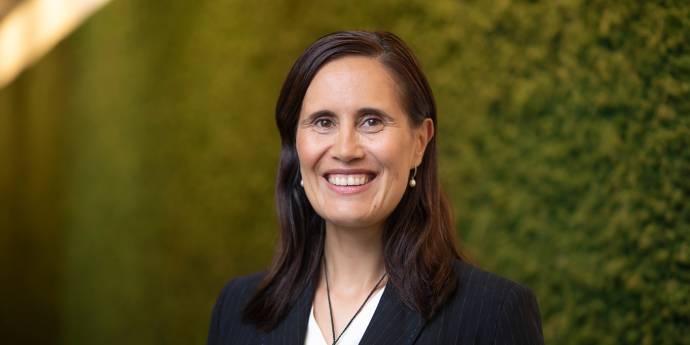Emerging benefits
When Bay of Plenty Emerging Director for 2017 Laurissa Cooney CMInstD took her seat at the table of host board Tourism Bay of Plenty (TBoP), the main aim was to give her a taste of what being a senior director was like. But the board got back plenty in return.

There is nothing like experience around the board table – except perhaps fresh ideas and perspectives. And this is something the Institute of Directors’ Emerging Director awards is proving successful at producing.
“Laurissa added such value that within about six months she was appointed to the role of a director when we had a vacancy come up,” says Des Hammond, chair of the TBoP board at the time and a former deputy chair of the local IoD branch committee.
“She thought strategically, she could see the big picture and could analyse the future in terms of where an organisation could and should be heading. She made a significant contribution to our long-term strategic plan during her engagement with us,” he says.
Hammond is a strong proponent of making Emerging Director award recipients full and active participants on their host boards – rather than taking them on as observers.
TBoP fully inducted Laurissa, encouraging her to participate like any other new director. This included being given full access to board and committee papers and being able to participate in everything but the resolution vote.
“I found that to be the best way to manage it quite frankly, and to ensure that everybody benefits,” Hammond says.
It certainly suited mother-of-four Cooney, who says she would have struggled to sit quietly without contributing.
“Everyone acknowledges that it’s a learning space and (my involvement) was done in a nurturing way,” she says.
Hammond says having an Emerging Director in the boardroom has tangible benefits.
“They bring a very fresh perspective to the debate. They frequently ask the obvious question that should be asked, but might not have been,” he says.
Cooney’s strong links with local iwi and ability to engage with all stakeholders and staff, were another real benefit to the board, as was her background in audit and risk with Deloitte. Within 18 months, Cooney had not only joined as a director, but taken over from Hammond as chair.
“She was a real rising star,” Hammond says.
Moving into the chair’s seat
Cooney says an executive leadership coaching course she had previously attended, which focused on developing the right mindset and raising one’s “consciousness”, held her in good stead for moving into the chair’s role.
“These skills help me in those situations where I feel challenged, to move beyond that, to become quite comfortable and not let any disempowered thoughts, or my inner critic, take over.”
Today, Cooney not only continues to chair the TBoP board, but is an independent non-executive director for listed entities Air New Zealand, Goodman NZ Ltd and Accordant Group and is a Trustee on the Charitable Investment Trust for Ngāi Tai Ki Tāmaki. Most recently she became a guardian/ director for The Aotearoa Circle.
Cooney’s top priorities for boards today
The world is a vastly different place to the one in which Cooney first pulled up her chair at the TBoP board table.
One of the top priorities for boards in the COVID-19 environment, is finding the right balance between their offensive and defensive tactics, she says. Companies need to build resilience within the organisation to cope with the uncertain times, while keeping an eye out for new opportunities to leverage.
“There are a number of silver linings that have come out of COVID-19, including an opportunity for deeper collaboration and relationship building across society. So, it is a matter of still keeping your eye on that, both in the short and long term.”
This includes closely monitoring the shifts in consumer behaviour taking place. Take for example, the trend of working from home - accelerated by the pandemic.
“It’s a matter of unpacking what that means for your organisation,” she says.
Technological developments are another area to watch, Cooney says, noting the rise in e-commerce, on-line education, the use of videoconferencing and hologram/avatar developments.
“History has shown us that after times of crisis, technological developments are quite quantum and I think it is important to prepare for that.”
A further priority for boards going forward will be a greater focus on people, the planet and evolving as a more sustainable and equitable world, she adds.
“I think there is just a lot more focus on doing the right thing for our people and our planet - that for me is important. I was brought up on the Whanganui River, which my iwi Te Ati Haunui-a-Pāpārangi has a very strong connection to.”
Directors also need to be able to “hover above” the current uncertainty to avoid being caught up in the sea of emotion and fear that can accompany it. Cooney believes meditation can be a great tool to help directors maintain the right mindset.
“On my boards I am an advocate for people looking after their wairua (spiritual) wellbeing. I have found that meditating daily, coupled with a focus on a higher consciousness mindset and energy frequency, allow me to be a more conscious creator.”
As Cooney herself has proven, being open to new ideas can be extremely beneficial.
The Emerging Director Awards are run each year. Recipients receive mentoring from an established director, up to $4000 towards professional development and one year’s complimentary membership of the IoD, in addition to gaining experience on a host board.
See your local IoD branch page for information on eligibility and application.